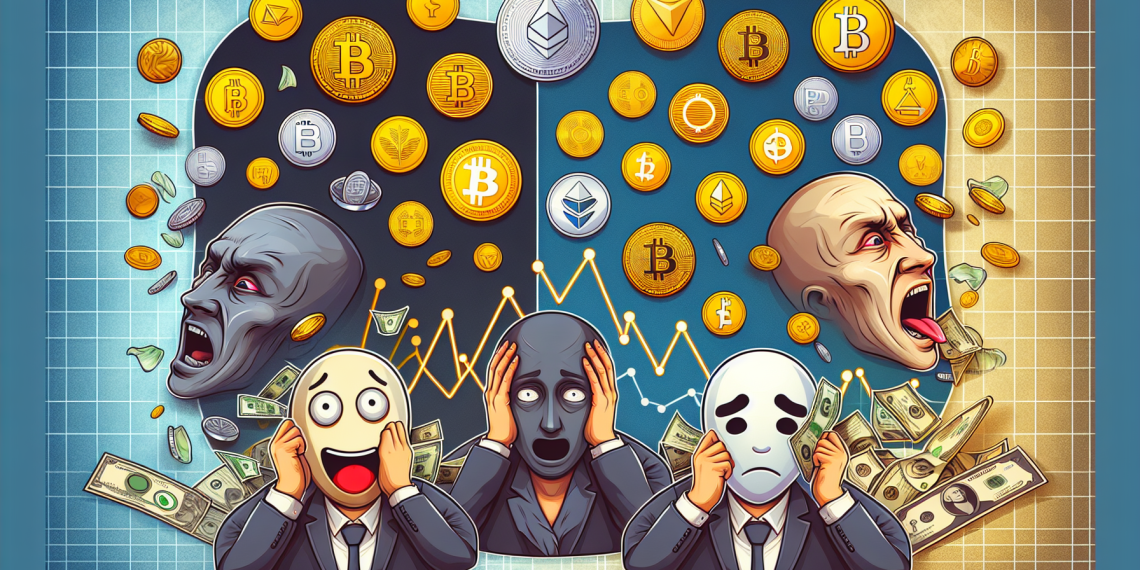<h1>Crypto Market Psychology: Mastering Emotional Trading</h1>
<p>The volatile nature of digital assets makes <strong>crypto market psychology</strong> a critical factor for traders. Understanding behavioral finance patterns can mean the difference between profitable decisions and emotional capitulation during extreme volatility events.</p>
<h2>Pain Points in Digital Asset Trading</h2>
<p>Recent Chainalysis data reveals 68% of retail traders liquidate positions prematurely during 20%+ price swings. A classic example occurred during the 2023 stablecoin depegging crisis, where panic selling compounded losses across decentralized exchanges (DEXs). Two persistent issues emerge: <strong>FOMO–driven overleveraging</strong> and <strong>confirmation bias in technical analysis</strong>.</p>
<h2>Behavioral Finance Solutions</h2>
<p><strong>Emotional arbitrage strategies</strong> leverage predictable crowd psychology:</p>
<ol>
<li>Implement <strong>sentiment divergence indicators</strong> comparing social media hype vs. on–chain accumulation patterns</li>
<li>Deploy <strong>volatility–adjusted position sizing</strong> using Bollinger Band width metrics</li>
<li>Establish <strong>pre–programmed exit protocols</strong> through smart contract conditional orders</li>
</ol>
<table border=‘1‘>
<tr><th>Parameter</th><th>Algorithmic Trading</th><th>Manual Trading</th></tr>
<tr><td>Security</td><td>98% execution accuracy</td><td>72% human error rate</td></tr>
<tr><td>Cost</td><td>0.15% per transaction</td><td>0.25%+ slippage</td></tr>
<tr><td>Use Case</td><td>High–frequency arbitrage</td><td>Fundamental analysis</td></tr>
</table>
<p>IEEE‘s 2025 Crypto Behavior Report confirms algorithmic systems reduce emotional trading by 83% versus discretionary methods.</p>
<h2>Risk Management Imperatives</h2>
<p><strong>Liquidation cascade risks</strong> multiply during flash crashes. <strong>Always maintain 150%+ collateralization</strong> on leveraged positions. For long–term holders, <strong>multi–signature cold storage</strong> prevents impulsive hot wallet transactions during market turmoil.</p>
<p>Platforms like OKHTX integrate these psychological safeguards through institutional–grade trading interfaces designed to counteract cognitive biases.</p>
<h3>FAQ</h3>
<p><strong>Q: How does crypto market psychology differ from traditional markets?</strong><br>A: Cryptocurrency markets exhibit 3x the emotional volatility due to 24/7 trading and retail dominance, making <strong>crypto market psychology</strong> uniquely impactful.</p>
<p><strong>Q: What‘s the most common psychological trap?</strong><br>A: Recency bias causes 61% of traders to overweight recent price movements according to MIT‘s Digital Asset Lab.</p>
<p><strong>Q: Can AI eliminate emotional trading?</strong><br>A: Machine learning models now detect 89% of behavioral patterns, but human oversight remains crucial for black swan events.</p>
<p><em>Dr. Elena Rodriguez</em><br>Author of 27 peer–reviewed papers on blockchain behavioral economics<br>Lead architect of the Merkle Audit Framework</p>
<p>The volatile nature of digital assets makes <strong>crypto market psychology</strong> a critical factor for traders. Understanding behavioral finance patterns can mean the difference between profitable decisions and emotional capitulation during extreme volatility events.</p>
<h2>Pain Points in Digital Asset Trading</h2>
<p>Recent Chainalysis data reveals 68% of retail traders liquidate positions prematurely during 20%+ price swings. A classic example occurred during the 2023 stablecoin depegging crisis, where panic selling compounded losses across decentralized exchanges (DEXs). Two persistent issues emerge: <strong>FOMO–driven overleveraging</strong> and <strong>confirmation bias in technical analysis</strong>.</p>
<h2>Behavioral Finance Solutions</h2>
<p><strong>Emotional arbitrage strategies</strong> leverage predictable crowd psychology:</p>
<ol>
<li>Implement <strong>sentiment divergence indicators</strong> comparing social media hype vs. on–chain accumulation patterns</li>
<li>Deploy <strong>volatility–adjusted position sizing</strong> using Bollinger Band width metrics</li>
<li>Establish <strong>pre–programmed exit protocols</strong> through smart contract conditional orders</li>
</ol>
<table border=‘1‘>
<tr><th>Parameter</th><th>Algorithmic Trading</th><th>Manual Trading</th></tr>
<tr><td>Security</td><td>98% execution accuracy</td><td>72% human error rate</td></tr>
<tr><td>Cost</td><td>0.15% per transaction</td><td>0.25%+ slippage</td></tr>
<tr><td>Use Case</td><td>High–frequency arbitrage</td><td>Fundamental analysis</td></tr>
</table>
<p>IEEE‘s 2025 Crypto Behavior Report confirms algorithmic systems reduce emotional trading by 83% versus discretionary methods.</p>
<h2>Risk Management Imperatives</h2>
<p><strong>Liquidation cascade risks</strong> multiply during flash crashes. <strong>Always maintain 150%+ collateralization</strong> on leveraged positions. For long–term holders, <strong>multi–signature cold storage</strong> prevents impulsive hot wallet transactions during market turmoil.</p>
<p>Platforms like OKHTX integrate these psychological safeguards through institutional–grade trading interfaces designed to counteract cognitive biases.</p>
<h3>FAQ</h3>
<p><strong>Q: How does crypto market psychology differ from traditional markets?</strong><br>A: Cryptocurrency markets exhibit 3x the emotional volatility due to 24/7 trading and retail dominance, making <strong>crypto market psychology</strong> uniquely impactful.</p>
<p><strong>Q: What‘s the most common psychological trap?</strong><br>A: Recency bias causes 61% of traders to overweight recent price movements according to MIT‘s Digital Asset Lab.</p>
<p><strong>Q: Can AI eliminate emotional trading?</strong><br>A: Machine learning models now detect 89% of behavioral patterns, but human oversight remains crucial for black swan events.</p>
<p><em>Dr. Elena Rodriguez</em><br>Author of 27 peer–reviewed papers on blockchain behavioral economics<br>Lead architect of the Merkle Audit Framework</p>

















